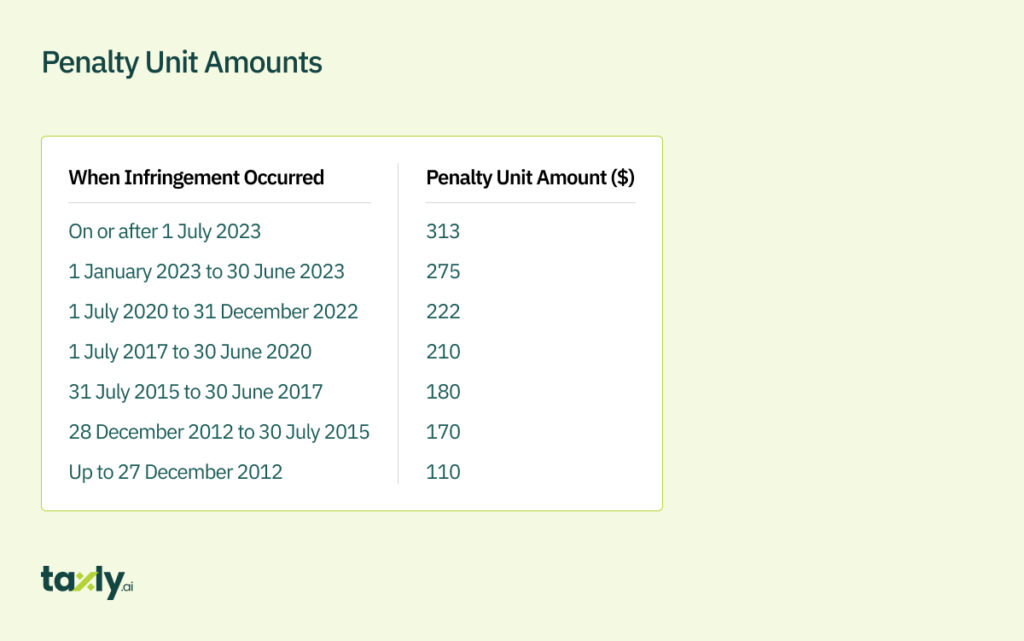The Australian Taxation Office (ATO) conducts audits and imposes various tax penalties to enforce tax compliance among citizens. Here’s an overview of different types of tax penalties Australia, when they apply, and common triggers for ATO audits:
When ATO Tax Penalties Australia Apply?
These penalties apply when taxpayers fail to meet their tax obligations, including filing tax returns, paying taxes owed, or providing accurate and timely information to the ATO.
5 Most Common ATO Penalties
Failure to Lodge (FTL) On Time Penalty
If you miss deadlines for submitting important documents like tax returns or activity statements, you might face a Failure to Lodge penalty. [1]
The longer the delay, the higher the penalty..
The penalties for failing to lodge documents on time (FTL) can differ based on your business size. These penalties are calculated per 28-day period that each document is overdue.
- For smaller businesses, a penalty unit of $210 may apply.
- For larger businesses, the penalty can go up to $1,050 (equivalent to five penalty units).
These penalties are a way to encourage timely document lodgment, reflecting the size and capacity of your business. Always stay updated with the latest ATO guidelines for precise and current information.
Failure to Pay (FTP) Penalty
When you don’t pay your tax debt by the due date, a Failure to Pay penalty might apply. This penalty increases as time goes on and is calculated based on a percentage of the unpaid amount. It’s a way to motivate timely payment of your tax bill. [2]
Substantial Understatement Penalty
If you underreport your tax by a significant amount (25% or more) due to carelessness or intention, you could face a Substantial Understatement penalty. The penalty ranges from 25% to 75% of the tax shortfall caused by the understatement. [3]
General Interest Charge (GIC)
While not exactly a penalty, the General Interest Charge is added to overdue tax debts. It’s like interest on a loan and is calculated daily based on the amount you owe. The rate is determined by market interest rates.
Administrative Penalty
Administrative penalties are for things like giving false information, not keeping required records, or not cooperating with the ATO’s requests. The amount varies depending on the seriousness of the issue, aiming to ensure accurate reporting and cooperation.
Can the ATO send you to jail?
The ATO can’t directly send you to jail, but they can take legal action if you seriously break tax laws, like committing fraud or tax evasion.
If you repeatedly avoid your tax responsibilities or intentionally evade taxes, the ATO will take legal steps. In extreme cases, ignoring tax obligations might lead to criminal charges.
The court will then decide on penalties including jail time.
ATO Penalty Units and How ATO Calculates Tax Penalties
ATO Penalty Units
The ATO uses penalty units to measure the financial value of penalties for various tax-related actions. [4]
The value of a penalty unit changes over time, and it’s set by the government to reflect inflation and other factors. This ensures fairness and consistency in penalty calculations.
Penalty Unit Amounts
The value of a penalty unit can change based on different time periods. Here are the penalty unit amounts for various periods:

ATO Notification and Payment
If you’re subject to a penalty, the ATO will send you a written notification. This notification will include the reason for the penalty, the amount you owe, and the due date for payment. The payment due date will be at least 14 days after you receive the notice. Importantly, it’s worth noting that penalties imposed by the ATO cannot be claimed as deductions.
Calculation of Penalties
The ATO calculates penalty amounts using either:
- A statutory formula based on your behaviour and the amount of tax avoided.
- Multiples of a penalty unit, depending on the seriousness of the offence.
How much is the penalty for a late tax return?
If you submit your tax return after the due date, you might face a late lodgment penalty. The tax penalty is about $222 for each 28-day period (or part thereof) your return is overdue, up to a maximum of $1,110.
The amount can be higher if you’ve been late before. It’s smart to check the latest ATO rules or consult a tax expert for the most current information.
Suggested Read: How Long Does Tax Return Take in Australia?
Does the ATO fine you for late tax returns?
Late tax returns can lead to significant penalties from the Australian Taxation Office (ATO), impacting your financial situation. To help you understand these penalties better, let’s delve into the details and the potential impact on your business.
How to Avoid Late Tax Return Penalties by ATO
To steer clear of these penalties, follow these steps:
Stay Informed
Be aware of your lodgment due dates. The ATO provides information on when your tax return is due.
Organize Your Documents
Gather all necessary documents well in advance, such as payment summaries, receipts, and financial records.
Use Online Services
E-filing through myTax or using a registered tax agent can simplify the process and help you meet deadlines.
Seek Professional Help
If you’re unsure about your tax situation, consult a registered tax agent or accountant to ensure accurate and timely submissions.
Apply for Extensions
In some cases, you can request an extension from the ATO if you need more time. Ensure you meet the conditions for an extension before applying.
Keep Records
Maintain organized records of your lodgment dates and communication with the ATO. This can be helpful if there’s a dispute about lodgment dates.
Review and Check
Before submitting your return, review it carefully to ensure accuracy. Mistakes can lead to delays and potential penalties.
What is the maximum penalty for tax evasion in Australia?
Tax evasion involves intentionally giving false information to reduce your taxes. Tax evasion can result in up to 10 years in prison.
Did You Know? The Commonwealth Bank of Australia Faced the Largest Civil Tax Penalty in 2018
In 2018, CBA agreed to pay a civil penalty of $700 million to settle a legal case brought against them by the Australian Transaction Reports and Analysis Centre (AUSTRAC).
It was alleged that CBA had breached anti-money laundering and counter-terrorism financing laws.
It was reported that CBA failed to report thousands of suspicious transactions and did not adequately monitor its own Intelligent Deposit Machines, which could have been used for money laundering and other illegal activities. This failure was seen as a breach of the law’s requirement to report suspicious transactions promptly.
The $700 million penalty was the largest civil penalty in Australian corporate history at that time.
[Source]
What triggers the ATO audit?
An ATO audit can be triggered by various factors, including:
Data Matching
The ATO uses advanced data-matching techniques to cross-reference information from various sources, such as banks, employers, and other government agencies, to identify inconsistencies.
Unusual Transactions
Large, unusual, or unexplained transactions can raise red flags and prompt an audit.
Industry Benchmarks
If a business’s financial performance significantly deviates from industry benchmarks, it might attract scrutiny.
Random Selection
The ATO also conducts random audits as part of its risk assessment strategy.
Tip-Offs
The ATO receives information from informants, including competitors, disgruntled employees, or concerned citizens, which could lead to audits.
Prior Non-Compliance
If a taxpayer has a history of non-compliance or errors in their tax reporting, they may be more likely to face an audit.
Specific Programs
The ATO may target specific industries or activities that are considered high-risk for non-compliance.
Don’t Worry – Just Comply with ATO To Avoid Tax Penalties Australia
ATO aims to ensure tax compliance – audits and penalties are not the sole punitive measures. ATO authorities provide an opportunity for taxpayers to correct errors and become compliant.
If the ATO communicates you about an audit or penalty, we advise you to engage with them promptly, seek professional advice, and provide accurate information to address the issue.
Explore Similar Content:
- Can You Claim Deductions Without Receipts in Australia?
- Can You Claim Gifts of Money under Donation Tax Deduction?
- How do I Find my Tax File Number in Australia?
References:
[1] FLT – ATO
[2] FTP – ATO
[3] False Statements Penalty – ATO
[4] Interest and Penalties – ATO


Comments are closed